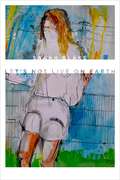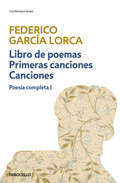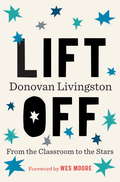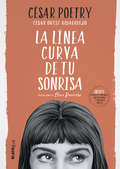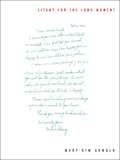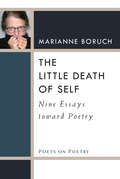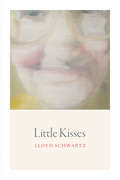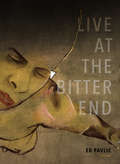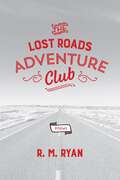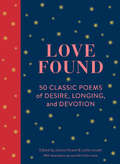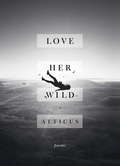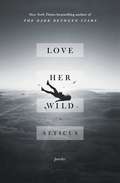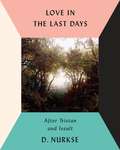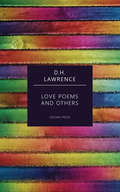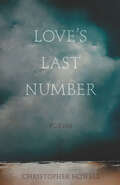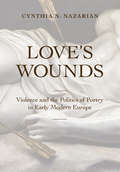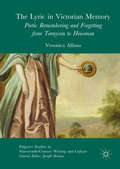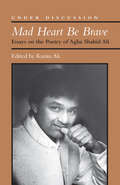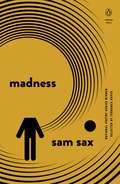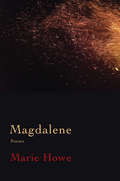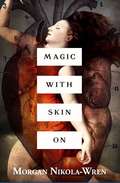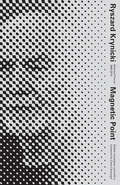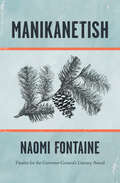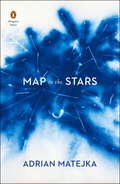- Table View
- List View
Let’s Not Live on Earth
by Sarah BlakeSarah Blake follows up her previous book of poetry, Mr. West, with a stunning second collection about anxieties and injury. Blake uses self-consciousness as a tool for transformation, looking so closely at herself that she moves right through the looking glass and into the larger world. Fear becomes palpable through the classification of monsters and through violences made real. When the poems find themselves in the domestic realm, something is always under threat. The body is never safe, nor are the ghosts of the dead. But these poems are not about cowering. By detailing the dangers we face as humans, as Americans, and especially as women, these poems suggest we might find a way through them. The final section of the book is a feminist, science fiction epic poem, “The Starship,” which explores the interplay of perception and experience as it follows the story of a woman who must constantly ask herself what she wants as her world shifts around her.
Libro de poemas | Primeras canciones | Canciones (Poesía completa #1)
by Federico García LorcaLibro de poemas | Primeras canciones | Canciones es el primer volumen de la Biblioteca Federico García Lorca y el primero que compila su «Poesía completa». La figura de Federico García Lorca abarca, tanto en España como en el exterior, mucho más que su literatura. Su poesía, traducida a infinidad de lenguas, recorre paisajes, hurga en tradiciones y denuncia injusticias con la maestría de quien ha sabido utilizar la pluma como pocos, y sus libros continúan leyéndose sin atender al paso del tiempo ni a las arbitrariedades de la moda. En este libro el lector podrá acercarse al joven Lorca, en cuya poesía germinan ya las grandes obras que lo erigieron en un maestro indiscutible, como el Libro de poemas, las Canciones, el Juego y teoría del duende o las Suites. La edición y los prólogos, a cargo de Miguel García-Posada, permiten al lector acercarse a la complejidad de su obra y disfrutar, a lo largo de los siete volúmenes que componen esta Biblioteca Federico García Lorca, de uno de los autores españoles más relevantes del siglo XX. Luis Buñuel dijo...«La obra maestra era él. Me parece, incluso, difícil encontrar a alguien semejante. Podía leer cualquier cosa, y la belleza brotaba siempre de sus labios. Tenía pasión, alegría, juventud. Era como una llama.» --------------------------------------------------------------------------BIBLIOTECA FEDERICO GARCÍA LORCA Poesía competa:1. Libro de poemas | Primeras canciones | Canciones2. Romancero gitano | Poema del cante jondo3. Poeta en Nueva York | Sonetos Teatro completo:4. La zapatera prodigiosa | Mariana Pineda5. El público | Así que pasen cinco años6. Bodas de sangre | Yerma7. La casa de Bernarda Alba | Doña Rosita la soltera--------------------------------------------------------------------------
Lift Off: From the Classroom to the Stars
by Wes Moore Donovan LivingstonAn inspirational rallying call about education, race, and the true nature of equality—the Harvard Graduate School of Education convocation speech praised as “powerful” by Hillary Rodham Clinton in Teen Vogue and “inspired” by Justin Timberlake In emotionally charged spoken-word poetry, Livingston shares a message of hope and hard truths, declaring that education can become an equalizer only if we first acknowledge the inequality and racial divides holding back America’s future. Livingston is dedicated to helping young people reach their celestial potential, and in his galvanizing commencement address, now adapted for the first time to the page, he calls on us to raise our voices on behalf of all children, as their brighter futures can light up our own. Together, we can lift off!
La línea curva de tu sonrisa (Colección #BlackBirds)
by César PoetryDescubre La línea curva de tu sonrisa, el libro de poesía revelación, y enamórate de César Poetry con esta edición que incluye audios con canciones de los poemas recitados, un prólogo de @Defreds y un epílogo de @TuristaEnTuPelo. Y qué tal si te propongo un día cualquiera, cuando te vea indecisa, clavar tus ojos, lentamente, en mi vida, y con la mirada que con tus iris, cada viernes improvisas, mueves la línea curva que lo endereza todo, tu sonrisa. #BlackBirds un refugio íntimo de papel. Libros irresistibles para leer, guardar y compartir. Es una nueva colección de espíritu indie y juvenil con contenido de no-ficción moderno: poesía, microcuentos, reflexiones, diarios... Su diseño rompedor y la colaboración de conocidos ilustradores, bloggers e instagrammers dan vida a estos libros que son pequeñas obras de arte, caprichos, que todos querremos tener, leer y atesorar.
Litany For The Long Moment
by Mary-Kim ArnoldThe orphan at the center of LITANY FOR THE LONG MOMENT is without homeland and without language. In three linked lyric essays, Arnold attempts to claim her own linguistic, cultural, and aesthetic lineage. Born in Korea and adopted to the US as a child, she explores the interconnectedness of language and identity through the lens of migration and cultural rupture. Invoking artists, writers, and thinkers—Theresa Hak Kyung Cha, Francesca Woodman, Susan Sontag, among others—LITANY FOR THE LONG MOMENT interweaves personal documents, images, and critical texts as a means to examine loss and longing.
The Little Death of Self: Nine Essays toward Poetry
by Marianne BoruchThe line between poetry (the delicate, surprising not-quite) and the essay (the emphatic what-about and so-there!) is thin, easily crossed. Both the poem and the essay work beyond a human sense of time. Both welcome a deep mulling-over, endlessly mixing image and idea and running with scissors; certainly each distrusts the notion of premise or formulaic progression. The essays in The Little Death of Self emerged by way of an odd detail or bothersome question that would not quit— Why does the self grow smaller as the poem grows enormous, or as quiet as a half-second of genuine discovery? Why does closure in a poem so often mean keep going, so what if the world is ending! Must we stalk the poem or does the poem stalk us until the world clicks open? Boruch’s intrepid curiosity led her to explore fields of expertise about which she knew little; then, perhaps through her reading, observation, and conversations with thoughtful people, she knew enough to be forgiven for delving into areas such as aviation, music, anatomy, history, medicine, photography, fiction, neuroscience, physics, anthropology, painting, and drawing. There’s an addiction to metaphor here, an affection for image, sudden turns of thinking, and the great subjects of poetry: love, death, time, knowledge. There’s amazement at the dumb luck of staying long enough in an inkling to make it a thought or a poem at all. Poets such as Keats, Stevens, Frost, Plath, Auden, and Bishop, along with painters, inventors, doctors, scientists, composers, musicians, neighbors, friends, and family—all traffic blatantly or under the surface—and one gets a glimpse of such fellow travelers now and then. The essays collected in The Little Death of Self are meditations toward poetry by a poet who finds this mysterious genre the weirdest, most compelling of all human ways to imagine—or fathom—the great world.
Little Kisses
by Lloyd SchwartzCalled “the master of the poetic one-liner” by the New York Times, acclaimed poet and critic Lloyd Schwartz takes his characteristic tragicomic view of life to some unexpected and disturbing places in this, his fourth book of poetry. Here are poignant and comic poems about personal loss—the mysterious disappearance of his oldest friend, his mother’s failing memory, a precious gold ring gone missing—along with uneasy love poems and poems about family, identity, travel, and art with all of its potentially recuperative power. Humane, deeply moving, and curiously hopeful, these poems are distinguished by their unsentimental but heartbreaking tenderness, pitch-perfect ear for dialogue, formal surprises, and exuberant sense of humor.
Little Kisses
by Lloyd SchwartzCalled “the master of the poetic one-liner” by the New York Times, acclaimed poet and critic Lloyd Schwartz takes his characteristic tragicomic view of life to some unexpected and disturbing places in this, his fourth book of poetry. Here are poignant and comic poems about personal loss—the mysterious disappearance of his oldest friend, his mother’s failing memory, a precious gold ring gone missing—along with uneasy love poems and poems about family, identity, travel, and art with all of its potentially recuperative power. Humane, deeply moving, and curiously hopeful, these poems are distinguished by their unsentimental but heartbreaking tenderness, pitch-perfect ear for dialogue, formal surprises, and exuberant sense of humor.
Live at the Bitter End
by Ed PavlicRecasting the “trial of the century,” Ed Pavli ’s vertiginous new collection puts a century of segregation on trial for its soulSet in the vernacular origins of modernity, Live at the Bitter End puts the racialized logic of 20th century aesthetics on trial. Mixing anonymous voices with the testimonies of figures such as Paul Cézanne, Charles Mingus, Emma Bardac, Erik Satie, Alberto Giacometti, Billie Holiday, Pierre Bonnard, Samuel Beckett, Miles Davis, and others, Ed Pavli weaves a playfully raucous and intimately violent work of satirical force. Adhering to the structure of a murder trial, Live at the Bitter End bears lyrical witness to racial separation, masquerade, mongrelization, and communion to show how those connections (in love, lust, trust and betrayal) sound deep in the textures of who we are.
The Lost Roads Adventure Club: Poems
by R. M. RyanIn a collection of poems that moves from meditations on emotions to struggles with a cancer diagnosis, from the comfortable world of sun and sand to the jarring dark corners of the so, R. M. Ryan offers us insights into the experience of living. The Lost Road Adventures Club recalls the ephemera of times and places gone by: a rosary pulled from an old coffee can in a small, shabby church; the clicks of a record player needle at the end of a 45; dusty chalk coating the hands of a teenage boy laden down with textbooks. Though grounded in precise observation of the world as it is, Ryan’s poetry also offers the reader a boundless capacity for imagined adventure: “Why shouldn’t this road / outside of Verona, Wisconsin / / be called Epic Lane?” he asks. “Poems start / from everywhere.” Sometimes lighthearted and sometimes disheartening, his poems travel across the years as they help us reach a new understanding of what it means to be human.
Love Found: 50 Classic Poems of Desire, Longing, and Devotion
by Leslie Jonath Jessica Strand Jennifer Orkin LewisFor new boos and long-wed couples alike, poetry is the ultimate gift of love. The classic love poems gathered in this elegant volume capture the full spectrum of romance—desire, longing, passion, and partnership. From Emily Dickinson's steamy declaration that "were I with thee / wild nights should be / our luxury!" to Langston Hughes's gorgeous image of love as "a ripe plum / growing on a purple tree," this is an exquisite collection of swoon-worthy love poems for the ages. Curated by authors Jessica Strand and Leslie Jonath, with illustrations by Jennifer Orkin Lewis, Love Found is perfect for Valentine's Day, weddings, anniversaries, or spur-of-the-moment romantic gestures.
Love Her Wild: Poetry
by Atticus PoetryFor fans of Milk & Honey and Chasers of the Light, the first collection of poetry by Instagram sensation Atticus. Love Her Wild is a collection of new and beloved poems from Atticus, the young writer who has captured the hearts and minds of hundreds of thousands of avid followers on his Instagram account @atticuspoetry In Love Her Wild, Atticus captures what is both raw and relatable about the smallest and the grandest moments in life: the first glimpse of a new love in Paris; skinny dipping on a summer's night; the irrepressible exuberance of the female spirit; or drinking whiskey in the desert watching the rising sun. With honesty, poignancy, and romantic flair, Atticus distils the most exhilarating highs and the heart-breaking lows of life and love into a few perfectly evocative lines, ensuring that his words will become etched in your mind and will awaken your sense of adventure.
Love Her Wild: Poems
by AtticusThe first collection of poetry by Instagram sensation AtticusLove Her Wild is a collection of new and beloved poems from Atticus, who has captured the hearts and minds of well over 300k followers on his Instagram account, @atticuspoetry, including superstars like Karlie Kloss and Shay Mitchell. With honesty, poignancy, and romantic flare, Love Her Wild captures what is both raw and relatable about the smallest and the grandest moments in life: the first glimpse of a new love, a late night drive singing along to a car radio, the irrepressible exuberance of the female spirit, the simple pleasure of a good whiskey. Atticus distills the most exhilarating highs and the heartbreaking lows of life and love into a few short lines, ensuring that his words will become etched in your mind—and will awaken your sense of adventure.
Love in the Last Days: After Tristan and Iseult
by D. NurkseA contemporary requiem--an earthy yet elegant reconsideration of the Tristan and Iseult story, from the former poet laureate of Brooklyn. In D. Nurkse's wood of Morois, the Forest of Love, there's a fine line between the real and the imaginary, the archaic and the actual, poetry and news. The poems feature the voices of the lovers and all parties around them, including the servant Brangien; Tristan's horse, Beau Joueur; even the living spring that flows through the tale ("in my breathing shadow / the lovers hear their voices / confused with mine / promising a slate roof, / a gate, a child . . . "). Nurkse brings us an Iseult who has more power than she wants over Tristan's imagination, and a Tristan who understands his fate early on: "That charm was so strong, no luck could free us." For these lovers, time closes like a book, but it remains open for us as we hear both new tones and familiar voices, eerily like our own, in this age-old story made new again.
Love Poems and Others
by D. H. LawrenceThe publication of Love Poems and Others brought Lawrence mixed reviews. The collection's often overt emphasis on sexuality proved controversial at the time of the book's publication.
Love's Last Number: Poems
by Christopher HowellFrom the author of Gaze, a collection of poetry reflecting on the human condition, time, and the passing of existence.From celebrated poet Christopher Howell, Love’s Last Number is a series of musings on time’s arrow: on both the relentless march that divides each moment into past, present, and future — before and after — and the ultimately porous and recursive nature of time itself. A soldier remembers limes, and curious children in Portugal. Refugees cross a dangerous land, and find each other in love. Boy scouts play war in devastating ways, a child listens to a baseball game in a more innocent time. In this multiplicity of voices and tones, the collection reflects on what we, as humans, do about memory, love, grief, war, and the search for meaning.In its sinuous sequences, Love’s Last Number insists that life—and history—are a continuing crisis of faith, imagination, consciousness, and moral clarity. And yet these poems, like existence itself, offer moments of transcendent joy and sudden hilarity: laughter against the darkness.Praise for Love’s Last Number“Howell demonstrates the imagination of a fabulist and the intellect of a philosopher in his richly contemplative poetry collection. . . . Love’s Last Number showcases a visionary mind and serves as a testament to the power of imagination in connecting human beings with each other.” —Shelf Awareness“These poems are great gifts. They contain multitudes of Whitmanesque wisdoms. These poems read as what our fathers would say to us after they are dead and gone. These poems are necessary. They are essential.” —John Hodgen, author of Grace
Love's Wounds: Violence and the Politics of Poetry in Early Modern Europe
by Cynthia N. NazarianLove's Wounds takes an in-depth look at the widespread language of violence and abjection in early modern European love poetry. Beginning in fourteenth-century Italy, this book shows how Petrarch established a pattern of inequality between suffering poet and exalted Beloved rooted in political parrhēsia. Sixteenth- and early seventeenth-century French and English poets reshaped his model into an idiom of extravagant brutality coded to their own historical circumstances. Cynthia N. Nazarian argues that these poets exaggerated the posture of the downtrodden lover, adapting the rhetoric of powerless desire to forge a new "countersovereignty" from within the heart of vulnerability—a potentially revolutionary position through which to challenge cultural, religious, and political authority. Creating a secular equivalent to the martyr, early modern sonneteers crafted a voice that was both critical and unstoppable because it suffered.Love’s Wounds tracks the development of the countersovereign voice from Francesco Petrarca to Maurice Scève, Joachim du Bellay, Théodore-Agrippa d’Aubigné, Edmund Spenser, and William Shakespeare. Through interdisciplinary and transnational analyses, Nazarian reads early modern sonnets as sites of contestation and collaboration and rewrites the relationship between early modern literary forms.
The Lyric in Victorian Memory
by Veronica AlfanoThis book is a study of nineteenth-century poems that remember, yearn for, fixate on, and forget the past. Reflecting the current critical drive to reconcile formalist and historicist approaches to literature, it uses close readings to trace the complex interactions between memory as a theme and the (often-memorable) formal traits - such as brevity, stanzaic structure, and sonic repetition - that appear in the lyrics examined. This book considers the interwoven nature of remembering and forgetting in the work of four Victorian poets. It uses this theme to shed new light on the relationship between lyric and narrative, on the connections between gender and genre, and on the way in which Victorians represented and commemorated the past.
Mad Heart Be Brave: Essays on the Poetry of Agha Shahid Ali
by Mohammed Kazim AliBorn and raised in Kashmir, Agha Shahid Ali (1949–2001) came to the United States in the mid-1970s to pursue graduate study in literature; by the mid-1980s, he had begun to establish himself as one of the most important American poets of the late 20th century. Mad Heart Be Brave: On the Poetry of Agha Shahid Ali is the first comprehensive examination of all stages of his career, from his earliest work published in India but never reissued in the U.S., through his seven poetry volumes from American publishers, ultimately collected as The Veiled Suite. The essays, written by a range of poets and scholars, many of whom knew and studied with Ali, consider his early free verse poetry; his transition into writing more formalist poetry; his correspondence with poets Anthony Hecht and James Merrill; his literary engagement with the political realities of contemporary Kashmir; his teaching and mentorship of young poets; and Ali’s championing of the ghazal, a traditional Eastern poetic form, in English. Some essays have a predominantly scholarly focus, while others are more personal in their tone and content. All exhibit a deep appreciation for Ali’s life and work. Contributors to this volume include Sejal Shah, Rita Banerjee, Amanda Golden, Ravi Shankar, Abin Chakraborty, Amy Newman, Christopher Merrill, Jason Schneiderman, Stephen Burt, Raza Ali Hassan, Syed Humayoun, Feroz Rather, Dur e Aziz Amna, Mihaela Moscaliuc, Reginald Dwayne Betts, Mahwash Shoaib, Shadab Zeest Hashmi, Grace Schulman, and Ada Limón. Mad Heart Be Brave closes with a long biographical sketch and elegy by Agha Shahid Ali’s friend Amitav Ghosh and a comprehensive bibliography assembled by scholar Patricia O’Neill with Reid Larson.
Madness
by Sam SaxAn “astounding” (Terrance Hayes) debut collection of poems – Winner of the 2016 National Poetry Series CompetitionIn this powerful debut collection, sam sax explores and explodes the linkages between desire, addiction, and the history of mental health. These brave, formally dexterous poems examine antiquated diagnoses and procedures from hysteria to lobotomy; offer meditations on risky sex; and take up the poet’s personal and family histories as mental health patients and practitioners. Ultimately, Madness attempts to build a queer lineage out of inherited language and cultural artifacts; these poems trouble the static categories of sanity, heterosexuality, masculinity, normality, and health. sax’s innovative collection embodies the strange and disjunctive workings of the mind as it grapples to make sense of the world around it.
Magdalene: Poems
by Marie Howe“Marie Howe’s poetry is luminous, intense, and eloquent, rooted in an abundant inner life.”—Stanely Kunitz Magdalene imagines the biblical figure of Mary Magdalene as a woman who embodies the spiritual and sensual, alive in a contemporary landscape—hailing a cab, raising a child, listening to news on the radio. Between facing the traumas of her past and navigating daily life, the narrator of Magdalene yearns for the guidance of her spiritual teacher, a Christ figure, whose death she continues to grieve. Erotic, spirited, and searching for meaning, she is a woman striving to be the subject of her own life, fully human and alive to the sacred in the mortal world.
Magic With Skin On
by Morgan Nikola-Wren Alysia Nicole Harris Julie Guzzetta Kimberly Ito Madeline Crowley Catrin Welz-Stein<P>In her much-anticipated debut poetry collection, Morgan Nikola-Wren has woven her signature romantic grit through a stunning, modern-day fairy tale.<P> Chronicling the relationship between a lonely artist and her absent-albeit abusive-muse, Magic with Skin On will gently break you, then put you back together again.<P> "Morgan's words will transport you, touch your heart and soul, even, at times, cut you.<P>
Magnetic Point: Selected Poems
by Ryszard Krynicki Clare CavanaghWith a splendid selection from a half century of marvelous poems, a major Polish poet appears in English at last One of Poland's greatest living poets—now in English at last—Ryszard Krynicki was born in 1943 in a Nazi labor camp, the son of Polish slave laborers. His 1969 volume, Act of Birth, marked the emergence of a major voice in the "New Wave" of Polish poetry. In Krynicki's work, political and poetic rebellion converged during the 1970s and '80s, he was arrested on trumped-up charges and forbidden from publishing. But his poetry is hardly just political. From the early dissident poems to his recent haiku, Krynicki's lyrical work taps deep wells of linguistic acuity, mysticism, compression, and wit.
Manikanetish
by Naomi FontaineIn Naomi Fontaine’s Governor General’s Literary Award finalist, a young teacher’s return to her remote Innu community transforms the lives of her students, reminding us of the importance of hope in the face of despair. After fifteen years of exile, Yammie, a young Innu woman, has come back to her home in Uashat, on Quebec’s North Shore. She has returned to teach at the local school but finds a community stalked by despair. Yammie will do anything to help her students. When she accepts a position directing the end-of-year play, she sees an opportunity for the youth to take charge of themselves. In writing both spare and polyphonic, Naomi Fontaine honestly portrays a year of Yammie’s teaching and of the lives of her students, dislocated, embattled, and ultimately, possibly, triumphant.
Map to the Stars
by Adrian MatejkaA resonant new collection of poetry from Adrian Matejka, author of The Big Smoke, a finalist for The Pulitzer Prize and the National Book Award Map to the Stars, the fourth poetry collection from National Book Award and Pulitzer Prize finalist Adrian Matejka, navigates the tensions between race, geography, and poverty in America during the Reagan Era. In the time of space shuttles and the Strategic Defense Initiative, outer space is the only place equality seems possible, even as the stars serve to both guide and obscure the earthly complexities of masculinity and migration. In Matejka's poems, hope is the link between the convoluted realities of being poor and the inspiring possibilities of transcendence and escape—whether it comes from Star Trek, the dream of being one of the first black astronauts, or Sun Ra's cosmic jazz.From the Trade Paperback edition.
